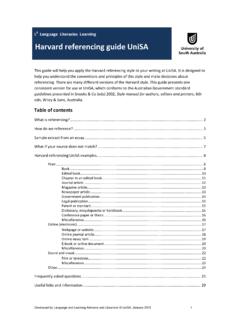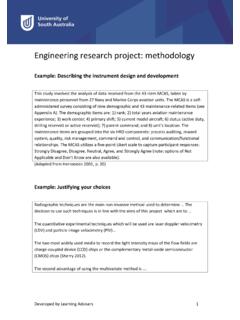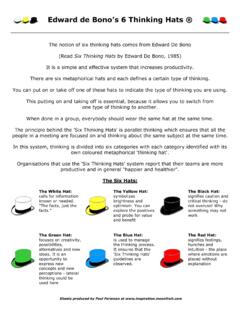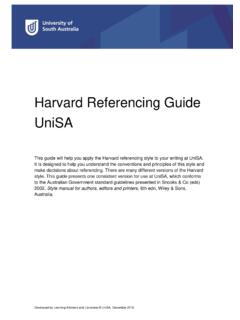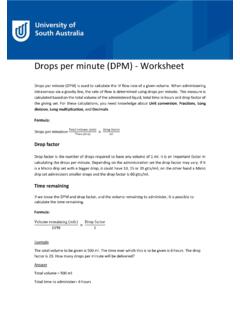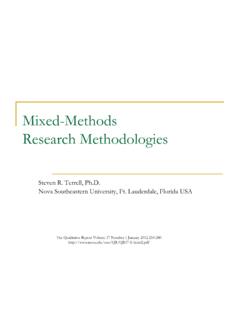Transcription of Epistemologies and Methodologies in Qualitative Research
1 Epistemologies and Methodologies in Qualitative ResearchDr Joanne Harmon BN (Hons) PhDOutlineThis presentation aims to outline in a simple manner the relationship between epistemology and methodology. The importance of axiology as part of the epistemology is is provided on how epistemology and methodology combine as a Simple Relationship between Epistemology, Methodology and MethodDefinitions EpistemologyEpistemology influences the methodologyThe study of the nature of knowledge and justification of beliefs held to be true, can be thought of as justification of knowledge and the theory of knowledge is inescapable as it is impossible to engage in knowledge creation without tacit assumptions about what knowledge is and how it is constructedInfluences: relationship between the Research and participant way in which quality of methods will be demonstrated how the researcher will communicate with the intended audienceEpistemology is AxiologicalEpistemology has ethical weight and therefore is axiological in relation to valuesAxiology relates to epistemology in two ways.
2 It is an epistemology itself and it is in the cultural context that informs epistemologyThe axiology of epistemology can be expressed as the values within that are normativeBasis for explaining the rightness or wrongness, the admissibility or inadmissibility of types of knowledge and sources of justification of that knowledge underpinning the epistemological approachEpistemology is surrounded by axiology in that the knowledge generated by a project will be discussed, evaluated and justified in relation to broader cultural valuesChoosing an Epistemological positionThe first starting point as epistemology is foundational and will directly influence the methodology and methods This decision matters as some Epistemologies and Methodologies are incommensurableDifferent variants of Methodologies will be linked specific epistemological positions (mainly by theoretical and disciplinary roots) Underpinned by the axiological statement on what will constitute trustworthy knowledge Definitions: MethodologyMethodology.
3 Justifies the methodsA theory and analysis of how Research should proceedAnalysis of the assumptions, principles and procedures in a particular approach to an inquiry A description, explanation and the justification of the methods usedMethodology connects Research to theory and disciplineEach variant of each methodology has risen from particular academic disciplines such as sociology, anthropology, philosophy, cultural studies and psychologyMethodologies can proscribe or encourage the use of existing or formal and substantive theories at two the determination of objectives, Research questions and study design analysis and in interpretation of findings Methodologies can encourage or discourage the development of substantive theories in the conduct of empirical workSelect a variant of methodologyThe answer to this question will be determined by the researchers chosen epistemic positionMay also be shaped by the discipline they have chosen to immerse themselves inThe methodology will provide a primary source of justification for the projects relationship to theoryMethodologies can be combined or altered provided the researcher retains a coherent epistemological position and can justify the choices made, preferably in relation to both the theoretical context of the methodology.
4 The axiological underpinning and impact of the change on method/s and the final Research product Applying the framework epistemology, methodology and methodsThe contributions of Method, Methodology, and Epistemology to Qualitative ResearchJustificationEpistemological justification depends on the internal consistency of the arguments put forward to support a knowledge claim based on the fit between the evidence, social theory and existing knowledgeNeeds to include critical reflection on the social roles and values of the Research team, the social processes of generating evidence and the role of substantive social theory in conceptualising the evidence and how it fits with background theory Methodological justification concerns the rationale given for the characteristic techniques used in the production of empirical evidence within a particular Research traditionEstablished methodological theories provide some conventical ways of handling some issues, but they are limited in the scope they can offer for critical reflection on the role of social theory in the production of evidence and are limited in the extent to which they can provide for new or unusual forms of Research technique Methodological theory cannot be used to justify the Research methods.
5 More so when the internal consistently of the epistemological argument is obscured and/or there is a failure to locate knowledge claims within a wider system of beliefs Therefore when constructing an epistemological justification for a claim that the findings of Qualitative inquiry have contributed to knowledge, it is notsufficient to state, This study used grounded theory to generate its findings or This study employed phenomenological , M. (2003). Do we need methodological theory to do Qualitative Research ? Qualitative Health Research , 13(7), 995-1004. Carter, S. M., & Little, M. (2007). Justifying knowledge, justifying method, taking action: Epistemologies , Methodologies , and methods in Qualitative Research . Qualitative Health Research , 17(10), 1316-1328.
